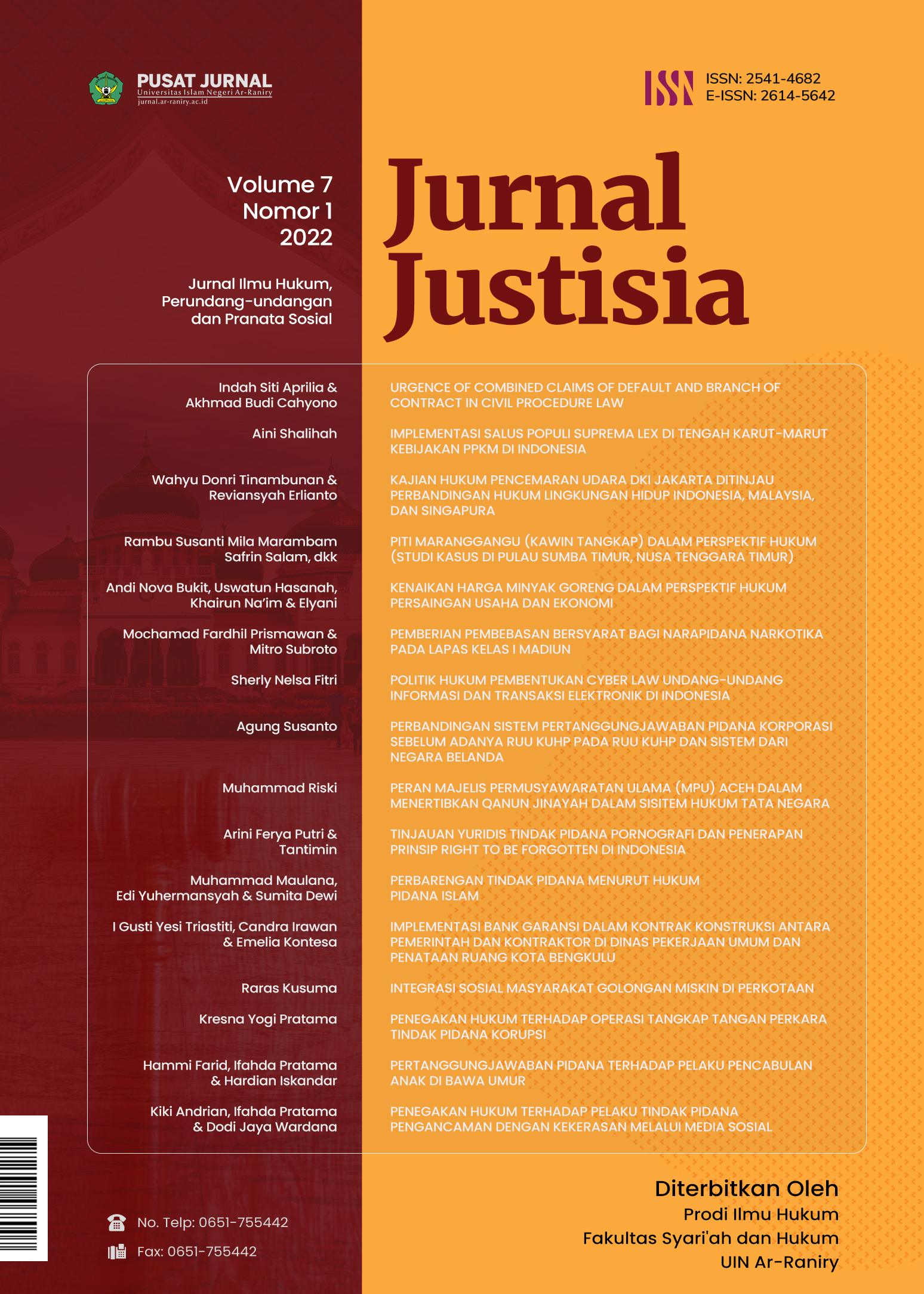Politik Hukum Pembentukan Cyber Law Undang-Undang Informasi dan Transaksi Elektronik di Indonesia
DOI:
https://doi.org/10.22373/justisia.v7i1.12719Abstract
This legal research aims to find the influence of legal politics in the change of cyber law in Indonesia. This legal research is normative law research. The legal materials used are primary legal materials and secondary legal materials. That the politics of law is the basis of the state, as stated in the 1945 Constitution of the Republic of Indonesia, paragraph 4. Until now, there are two cyber laws (UU ITE) that have been and are or are still valid in Indonesia. The change of Cyberlaw (UU ITE) occurs because of the influence of political law that becomes the basic policy that determines the direction, form, and content of the law that will be formed by the needs of the state at the time of the law is in force and the politics of the interests of the government at the time the law is in force.
References
Arief, Barda Nawawi. Tindak Pidana Mayantara Perkembangan Kajian Cybercrime Di Indonesi. Jakarta: RajaGrafindo Persada, 2006.
Bapenda Jawa Barat. “Pengertian Cybercrime Dan Cyber Law.” Accessed March 5, 2021. https://bapenda.jabarprov.go.id/2017/11/07/pengertian-cyber-crime-dan-cyber-law/.
Hartono, C.F.G. Sunaryati. Politik Hukum Menuju Satu Sistem Hukum Nasional. Bandung: Alumni, 1991.
Juwana, Hikmahanto. “POLITIK HUKUM UU BIDANG EKONOMI DI INDONESIA.” Jurnal Hukum 01, no. 1 (2005).
Kominfo. “Menilik Sejarah Undang-Undang Informasi Dan Transaksi Ekonomi Dalam Tok-Tok Kominfo.” https://aptika.kominfo.go.id/2019/02/menilik-sejarah-uu-ite-dalam-tok-tok-kominfo-13/.
Laksana, Andri Winjaya. “Cybercrime Comparison Under Criminal Law In Some Countries.” Jurnal Pembaharuan Hukum 5, no. 2 (2018): 217–226.
MENTERI HUKUM DAN HAK ASASI MANUSIA REPUBLIK, and INDONESIA. UNDANG-UNDANG REPUBLIK INDONESIA NOMOR 11 TAHUN 2008 TENTANG INFORMASI DAN TRANSAKSI ELEKTRONIK, 2008.
Moh. Mahfud MD. Membangun Politik Hukum Menegakkan Konstitusi. Jakarta: Rajawali Press, 2012.
———. Politik Hukum Di Indonesia. Jakarta: Raja Grafindo Persada, 2009.
Napitupulu, Darmawan. “Kajian Peran Cyber Law Dalam Memperkuat Keamanan Sistem Informasi Nasional.” Deviance Jurnal Kriminologi 1, no. 1 (2017): 107.
Peter Mahmud Marzuki. Penelitian Hukum. Jakarta: Kencana Prenada, 2014.
Rahardjo, Satjipto. Ilmu Hukum. Bandung: Aditya Bakti, 1991.
Rosenoer, Jonathan. “Misappropriation of Information.” CyberLaw The Law of the Internet (1997): 249–253. https://www.springer.com/gp/book/9780387948324.
Saefulloh, Aris. “KEBANGKITAN AGAMA DI TENGAH PERADABAN GLOBAL.” Jurnal Al- Ulum 11, no. 1 (2011): 173–188.
Sujamawardi, Lalu Heru. “Analisis Yuridis Pasal 27 Ayat (1) Undang-Undang Nomor 19 Tahun 2016 Tentang Perubahan Atas Undang-Undang Nomor 11 Tahun 2008 Tentang Informasi Dan Transaksi Elektronik.” Dialogia Iuridica: Jurnal Hukum Bisnis dan Investasi 9, no. 2 (2018): 84–100.
Downloads
Published
Issue
Section
License
The Authors submitting a manuscript do so on the understanding that if accepted for publication, copyright of the article shall be assigned to Jurnal Justisia : Jurnal Ilmu Hukum, Perundang-undangan dan Pranata Sosial, Ar-Raniry State Islamic University, Indonesia as the publisher of the journal.
Jurnal Justisia : Jurnal Ilmu Hukum, Perundang-undangan dan Pranata Sosial right of first publication with the work simultaneously licensed under Creative Commons Attribution-ShareAlike 4.0 International License (CC BY-SA 4.0) that allows others to share (copy and redistribute the material in any medium or format) and adapt (remix, transform, and build upon the material) the work for any purpose, even commercially with an acknowledgment of the work's authorship and initial publication in Jurnal Justisia : Jurnal Ilmu Hukum, Perundang-undangan dan Pranata Sosial. Authors are able to enter into separate, additional contractual arrangements for the non-exclusive distribution of the journal's published version of the work (e.g., post it to an institutional repository or publish it in a book), with an acknowledgment of its initial publication in Jurnal Justisia : Jurnal Ilmu Hukum, Perundang-undangan dan Pranata Sosial. Authors are permitted and encouraged to post their work online (e.g., in institutional repositories or on their website) prior to and during the submission process, as it can lead to productive exchanges, as well as earlier and greater citation of published work (See The Effect of Open Access).

